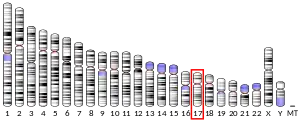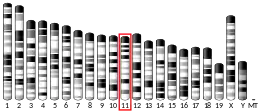GPR179
Probable G-protein coupled receptor 179 is a protein that in humans is encoded by the GPR179 gene.[5]
| GPR179 | |||||||||||||||||||||||||
|---|---|---|---|---|---|---|---|---|---|---|---|---|---|---|---|---|---|---|---|---|---|---|---|---|---|
| Identifiers | |||||||||||||||||||||||||
| Aliases | GPR179, CSNB1E, GPR158L, GPR158L1, G protein-coupled receptor 179 | ||||||||||||||||||||||||
| External IDs | OMIM: 614515 MGI: 2443409 HomoloGene: 34917 GeneCards: GPR179 | ||||||||||||||||||||||||
| |||||||||||||||||||||||||
| |||||||||||||||||||||||||
| |||||||||||||||||||||||||
| Orthologs | |||||||||||||||||||||||||
| Species | Human | Mouse | |||||||||||||||||||||||
| Entrez | |||||||||||||||||||||||||
| Ensembl | |||||||||||||||||||||||||
| UniProt | |||||||||||||||||||||||||
| RefSeq (mRNA) | |||||||||||||||||||||||||
| RefSeq (protein) | |||||||||||||||||||||||||
| Location (UCSC) | Chr 17: 38.33 – 38.34 Mb | Chr 11: 97.33 – 97.35 Mb | |||||||||||||||||||||||
| PubMed search | [3] | [4] | |||||||||||||||||||||||
| Wikidata | |||||||||||||||||||||||||
| |||||||||||||||||||||||||
Clinical relevance
Mutations in this gene have been associated to cases of congenital stationary Night Blindness.[6]
References
- ENSG00000277399 GRCh38: Ensembl release 89: ENSG00000276469, ENSG00000277399 - Ensembl, May 2017
- GRCm38: Ensembl release 89: ENSMUSG00000070337 - Ensembl, May 2017
- "Human PubMed Reference:". National Center for Biotechnology Information, U.S. National Library of Medicine.
- "Mouse PubMed Reference:". National Center for Biotechnology Information, U.S. National Library of Medicine.
- "Entrez Gene: GPR179 G protein-coupled receptor 179".
- Audo I, Bujakowska K, Orhan E, Poloschek CM, Defoort-Dhellemmes S, Drumare I, Kohl S, Luu TD, Lecompte O, Zrenner E, Lancelot ME, Antonio A, Germain A, Michiels C, Audier C, Letexier M, Saraiva JP, Leroy BP, Munier FL, Mohand-Saïd S, Lorenz B, Friedburg C, Preising M, Kellner U, Renner AB, Moskova-Doumanova V, Berger W, Wissinger B, Hamel CP, Schorderet DF, De Baere E, Sharon D, Banin E, Jacobson SG, Bonneau D, Zanlonghi X, Le Meur G, Casteels I, Koenekoop R, Long VW, Meire F, Prescott K, de Ravel T, Simmons I, Nguyen H, Dollfus H, Poch O, Léveillard T, Nguyen-Ba-Charvet K, Sahel JA, Bhattacharya SS, Zeitz C (Feb 10, 2012). "Whole-Exome Sequencing Identifies Mutations in GPR179 Leading to Autosomal-Recessive Complete Congenital Stationary Night Blindness". American Journal of Human Genetics. 90 (2): 321–30. doi:10.1016/j.ajhg.2011.12.007. PMC 3276675. PMID 22325361.
Further reading
- Bjarnadóttir TK, Fredriksson R, Schiöth HB (2006). "The gene repertoire and the common evolutionary history of glutamate, pheromone (V2R), taste(1) and other related G protein-coupled receptors". Gene. 362: 70–84. doi:10.1016/j.gene.2005.07.029. PMID 16229975.
This article is issued from Wikipedia. The text is licensed under Creative Commons - Attribution - Sharealike. Additional terms may apply for the media files.



